Hey there, fellow movie fan. My name is Justin, and Zack Snyder is my favorite director. Also, The Fountainhead by writer/philosopher Ayn Rand is my favorite book. So as you can imagine, I’m pretty excited by Snyder recently confirming that his next movie is an adaptation of The Fountainhead. I’ve talked about Snyder for years on my podcast, even doing a series of episodes analyzing his movies. And, in all honesty, I’m probably an Objectivist (someone who agrees with and lives by Rand’s philosophy of Objectivism), but I hesitate to call myself one in this day and age because “fuck your group.”
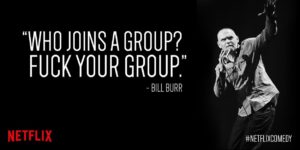
That mentality and excitement is exactly why I wrote this FAQ. I’m sure you’re hearing a lot of stuff from a lot of group members right now–Objectivists, anti-Objectivists, Snyder fans, anti-Snyder people. And sure, each of them have a piece of the truth, but their strict adherence to their group identity makes it hard for them to see the whole (motion) picture.
Enter me. I’m like Johnny Lawrence in Cobra Kai. Maybe I seem like I have nothing to add to the conversation because I’m over here on the fringes, but give me ten episodes and you’ll be striking first and hard. Seriously though, below is a list of questions and answers that will help you ignore the noise around Snyder and his next movie so you can GET EXCITED.
And if you have anything to add or correct, please reach out to me, and we’ll make the change.
Should I read The Fountainhead before watching the movie?
Yes, mainly just because it’s a great book.
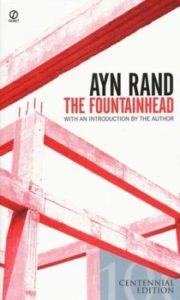
Read this. There’s like a hundred different covers though, so don’t worry if your copy has a weird figure holding an Infinity Stone or something on it.
In all seriousness, no one can answer this question but yourself. I personally find value in reading the source material before watching the adaptation as it helps me better understand the choices the director made. I read Watchmen before seeing the movie. I read The Walking Dead comic just enough to try and stay ahead of the television storyline. You may prefer to go in with a clean slate. That approach can work too. I still haven’t read 300 but love the movie.
It should be noted though that the book is in 4 parts with a total of 59 chapters. No adaptation, except perhaps a miniseries, will capture the whole story. So, if you don’t read it before seeing the movie, you should definitely read it after you do.
Is Zack Snyder the right person to adapt the book?
Snyder is a romantic (Rand’s preferred artistic approach) who once described himself as having “this sort of Ayn Rand aesthetic” and most of his filmography is adaptations, so what do you think? Here’s a rundown of the material he’s brought to the screen:
- Dawn of the Dead by George Romero (remake)
- 300 by Frank Miller
- Watchmen by Alan Moore & Dave Gibbons
- Guardians of Ga’Hoole by Kathryn Lasky
- All-Star Superman by Grant Morrison
- Superman: Earth One by J. Michael Straczynski
- Superman: Birthright by Mark Waid
- Superman: Secret Origin by Geoff Johns
- The Dark Knight Returns by Frank Miller
- The Death of Superman by Numerous
In fact, he’s only made one completely original movie, and many of the sequences in Sucker Punch are intentionally constructed as mashups of popular nerd/geek properties and genres.
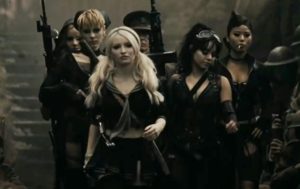
Totally not referencing Call of Duty or Wolfenstein.
Additionally, many of his movies already feature ideas that are similar to the ideas in The Fountainhead (individualism, independent thought, freedom, reason, love).
Finally, his recent experiences with the production of Justice League will inform his understanding of The Fountainhead on a deeply personal and experiential level. Much has been written about what happened, so I won’t rehash but the basics are as follows. He shot the movie. He edited a version of the movie (how complete it was is not widely known). He left the movie due to a personal tragedy. Another director took over production, reshot the movie, and appropriated Snyder’s original content for a different plot and theme. The parallels between Snyder and the protagonist of Rand’s novel are so apparent it’s astounding.
I haven’t read The Fountainhead. What is it about?
The Fountainhead follows an architect named Howard Roark who refuses to compromise his artistic vision for anyone or any reason as he encounters various people and situations that challenge him to abandon his principles.

While standing buck naked on a cliff.
The theme of the novel, as stated by Rand herself, is “individualism versus collectivism, not in politics, but in man’s soul.”
How faithful will Snyder be to the plot and theme of The Fountainhead?
Odds are that Snyder will be extremely, if not 100%, faithful, in a 2016 interview with The Hollywood Reporter, he said:
“I’ve always felt like The Fountainhead was such a thesis on the creative process and what it is to create something. Warner Bros. owns [Ayn Rand’s] script and I’ve just been working on that a little bit.”
This quote seems to imply he is storyboarding off of Rand’s script (which personally would be an insane thing to say). However, it’s impossible to how exactly he’s using the original script from that short quote.
Additionally, in all of his previous adaptations, he stuck to the source material faithfully, often shooting the source comics panel-by-panel such as with 300 and Watchmen.
It should be noted, however, that he did change the ending of Watchmen from the comic. Snyder explained his decision:
“The reason that the squid got taken out of the movie was so there’d be more Rorschach and a little bit more Manhattan. Because we did the math, and we figured it took about 15 minutes to explain [it] correctly; otherwise, it’s pretty crazy.”
Basically, he changed the ending for movie production purposes. The original ending just didn’t make sense in a motion picture due to story and runtime. However it needs to be noted that the new ending did give the movie the exact opposite philosophical outlook of the comic, so there’s a chance he could do the same thing to The Fountainhead. On the other had, the original comic is nihilistic and collectivistic, and the two characters he added more of (Rorschach and Manhattan) are the most Roark like.
(Spoiler Warning: The rest of this answer discusses the specifics of two scenes from The Fountainhead.)
The Fountainhead offers two scenes in particular that may be difficult to adapt in the current culture: the “rape” and the destruction of Cortlandt Homes.
Though Rand herself stated of the rape scene “[i]f it was rape, it was rape by engraved invitation,” it’s hard to accept that expalantion in today’s #metoo culture because “rape by…invitation” is a contradiction in terms. However, sexuality is complex, and Rand’s especially was. I’d personally describe her view of idealized intercourse as Klingon. In other words, she seemed to have a preference for rough sex. Additionally, most viewers are used to sex being portrayed naturalistically, so they wouldn’t see the act as anything more than what it immediately physically appears to be. Romantically, however, a sex scene should embody and represent the psychologies and choices of the characters such as how Snyder executed the sex scenes in Watchmen and 300.
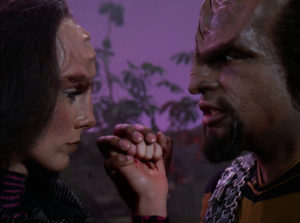
This foreplay is either from Star Trek: The Next Generation or Atlas Shrugged. I can’t remember which.
The destruction of Cortlandt Homes, on the other hands, is a integral scene. Critics of the novel describe the explosion as a terrorist attack, a characterization that, again, presents a huge challenge in our current culture. Context matters, though, and Rand goes into intricate detail to show the true meaning of the event, and if there’s one director who can show the reasoning and passion beyond the action, it’s Snyder.
Isn’t Snyder a visualist?
Yes, and I don’t understand how people use this label as a criticism. Film is a visual medium. You don’t just perform a play and film it. So isn’t a director being a visualist ideal?
Look at it another way. Would it be right to critique painters such as Picasso, Monet, and Rembrandt by calling them visualists? In fact, Snyder approaches storyboarding and directing with a painter’s mindset as he “spent a year studying painting at the Heatherly School of Fine Art in London.” It’s why he uses so much CGI, especially for backgrounds. He’s using technology to paint each frame. (No, I’m not saying Snyder is as good as these painters.)
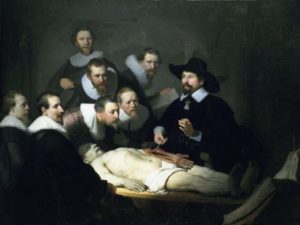
Rembrandt was such a fucking visualist.
More generously, people use this critique to say Snyder is just a visualist. While I don’t think that statement is fair, it is interesting to think about who he’s adapted from and collaborated with–George Romero, Frank Miller, Alan Moore, Christopher Nolan and David Goyer (the writers of The Dark Knight), and Chris Terrio (Academy Award winner writer of Argo). He even had a co-writer on Sucker Punch, his one original screenplay. So, while Snyder relies heavily on visual symbolism and composition, he balances it with intricate plot structure and dialogue by working with and adapting from trained and talented writers. And if there’s any qualities of Rand’s writing that are unassailable, it’s the intricate plot structure and heavily character-drive dialogue.
Ok, I’m on board for Zack Snyder, but isn’t Rand’s work itself unfilmable?
Recent history would suggest that this claim is correct. However, recent history was also written by men who didn’t know what they were doing. The mismanagement of the Atlas Shrugged triology probably deserves a documentary of its own. Rand’s work, however, is not more challenging to adapt than any other novel. The challenge of the novel-to-film adaptation process is making something that is primarily textual primarily visual, and we already know Snyder is a visualist.
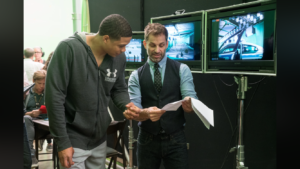
Trust me, it’s going to look cooler if you’re not in a sweatsuit the whole time.
The biggest challenge in adapting Rand’s writing is that her characters made a lot of speeches.
Is Rand a right wing/conservative author/thinker?
No, Rand was as critical of the right as she was of the left. She once wrote that, “the Conservative Party…subordinates reason to faith, and substitutes theocracy for capitalism.”
Rand was even critical of libertarians. Basically, she applauded what she saw as good and decried what she saw as bad in every political movement and group. But since you asked about the right wing in particular, here’s another choice quote about it, this one coming from her essay “Conservatism: An Obituary:”
Today’s “conservatives” are futile, impotent and, culturally, dead. They have nothing to offer and can achieve nothing. They can only help to destroy intellectual standards, to disintegrate thought, to discredit capitalism, and to accelerate this country’s uncontested collapse into despair and dictatorship.
If Rand was so critical of conservatives and libertarians, why do they tend to be drawn to her more than “liberals”? The reason is likely different for each person and I’m not a psychologist, but I would venture her appeal to them has something to do with her defense of capitalism, individualism, and America, as many at least give lip service to the advocacy of small government. Conversely, the left openly advocates for larger government, a position that is at odds with Rand’s core beliefs even though she did hold some beliefs that are conventionally considered leftist.
You can read more quotes from her critiques of conservatives here.
And if you’re curious, here are some of her critiques of “liberals” and libertarians.
Doesn’t Objectivism, the philosophy Rand created and showed through her fiction, say to only care about your own goals/to pursue your own happiness above all else with frequent disregard for the wants and needs of others?
No is the simple answer to this common misunderstanding of Rand trumpeting the “virtue of selfishness.” The complex answer is about the words “only” and “frequent disregard.” There are many quotes from Rand’s writing that address these flawed characterizations, but the best one to choose is from our relevant subject matter itself The Fountainhead. Late in the story Howard Roark says:
“Peter, before you can do things for people, you must be the kind of man who can get things done. But to get things done, you must love the doing, not the secondary consequences. The work, not the people. Your own action, not any possible object of your charity. I’ll be glad if people who need it find a better manner of living in a house I designed. But that’s not the motive of my work. Nor my reason. Nor my reward.”
Here, Roark is sharing his psychological approach to work. The two bold sentences demonstrate that though Roark is selfish, he does not only care about his own goals and does not disregard others’ wants and needs. On the contrary, he recognizes the wants and needs of others as real and is glad his work can satisfy them. That happiness is just secondary to the happiness he feels from the pride of doing, of building.
Which Snyder movies should I watch before The Fountainhead?
It’s really hard not to simply say “all of them,” but here are the essentials:
300 brought him his mainstream success and is beloved by many people. It also features Objectivist themes and abs.
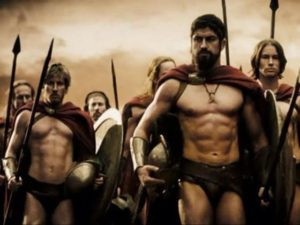
The Objectivist themes in 300. No, wait, that’s the abs.
Watchmen includes many complex ideas and is considered by some to be his best work.
Sucker Punch is his one original story and is his most ambitious project, showing you his artistic approach.
All of these answers seem pretty straight forward, so why are Snyder and Rand so polarizing?
You’ll partially get the answer to this question by reading The Fountainhead. There’s more to the story though. As previously mentioned, Rand was critical of everyone and everything and did so with a rapier wit with both the pen and tongue. Why was she so critical? She believed that the philosophy and moral code that humanity has lived by for most of its existence is not only flawed but evil. It’s no surprise many people didn’t take kindly to her.
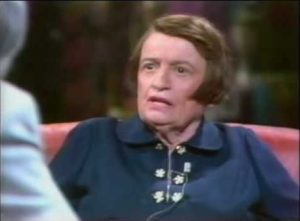
The look of someone who can’t believe what most people are saying most of the time.
Like Rand, Snyder has a habit of making movies that upset everyone, especially as of late. His work in the DC movies universe recast Superman as “just a guy trying to do the right thing” rather than an altruistic Jesus-figure, challenging a cherished cultural symbol of both the left and the right in one fell swoop. Likewise, in Batman v. Superman, he leaned into Batman’s psychological trauma and away from his healthy detective mind and aversion for guns and killing, again upsetting everyone. With Watchmen, he gave the movie a different ending than the book, changing the story’s meaning and angering the books most ardent fans. I could say similar things about his other movies as well.
More fundamentally, Snyder makes romantic epics in a culture that heralds naturalistic dirges. Similarly, Rand wrote an entire book called “The Romantic Manifesto” decrying the common trend of Naturalism and championing her style of “Romantic Realism.” Thus, it’s not unimaginable to think that Rand might have liked Snyder’s self-described “Ayn Rand aesthetic,” especially considering it, and his personal love for body building, celebrate traditional masculinity and taking care of your body. Both Rand and Snyder are surely decried as patriarchal bodyshamers somewhere in our current culture.
Zack Snyder and The Fountainhead: The Questions You’re Asking
Hey there, fellow movie fan. My name is Justin, and Zack Snyder is my favorite director. Also, The Fountainhead by writer/philosopher Ayn Rand is my favorite book. So as you can imagine, I’m pretty excited by Snyder recently confirming that his next movie is an adaptation of The Fountainhead. I’ve talked about Snyder for years on my podcast, even doing a series of episodes analyzing his movies. And, in all honesty, I’m probably an Objectivist (someone who agrees with and lives by Rand’s philosophy of Objectivism), but I hesitate to call myself one in this day and age because “fuck your group.”
That mentality and excitement is exactly why I wrote this FAQ. I’m sure you’re hearing a lot of stuff from a lot of group members right now–Objectivists, anti-Objectivists, Snyder fans, anti-Snyder people. And sure, each of them have a piece of the truth, but their strict adherence to their group identity makes it hard for them to see the whole (motion) picture.
Enter me. I’m like Johnny Lawrence in Cobra Kai. Maybe I seem like I have nothing to add to the conversation because I’m over here on the fringes, but give me ten episodes and you’ll be striking first and hard. Seriously though, below is a list of questions and answers that will help you ignore the noise around Snyder and his next movie so you can GET EXCITED.
And if you have anything to add or correct, please reach out to me, and we’ll make the change.
Should I read The Fountainhead before watching the movie?
Yes, mainly just because it’s a great book.
Read this. There’s like a hundred different covers though, so don’t worry if your copy has a weird figure holding an Infinity Stone or something on it.
In all seriousness, no one can answer this question but yourself. I personally find value in reading the source material before watching the adaptation as it helps me better understand the choices the director made. I read Watchmen before seeing the movie. I read The Walking Dead comic just enough to try and stay ahead of the television storyline. You may prefer to go in with a clean slate. That approach can work too. I still haven’t read 300 but love the movie.
It should be noted though that the book is in 4 parts with a total of 59 chapters. No adaptation, except perhaps a miniseries, will capture the whole story. So, if you don’t read it before seeing the movie, you should definitely read it after you do.
Is Zack Snyder the right person to adapt the book?
Snyder is a romantic (Rand’s preferred artistic approach) who once described himself as having “this sort of Ayn Rand aesthetic” and most of his filmography is adaptations, so what do you think? Here’s a rundown of the material he’s brought to the screen:
In fact, he’s only made one completely original movie, and many of the sequences in Sucker Punch are intentionally constructed as mashups of popular nerd/geek properties and genres.
Totally not referencing Call of Duty or Wolfenstein.
Additionally, many of his movies already feature ideas that are similar to the ideas in The Fountainhead (individualism, independent thought, freedom, reason, love).
Finally, his recent experiences with the production of Justice League will inform his understanding of The Fountainhead on a deeply personal and experiential level. Much has been written about what happened, so I won’t rehash but the basics are as follows. He shot the movie. He edited a version of the movie (how complete it was is not widely known). He left the movie due to a personal tragedy. Another director took over production, reshot the movie, and appropriated Snyder’s original content for a different plot and theme. The parallels between Snyder and the protagonist of Rand’s novel are so apparent it’s astounding.
I haven’t read The Fountainhead. What is it about?
The Fountainhead follows an architect named Howard Roark who refuses to compromise his artistic vision for anyone or any reason as he encounters various people and situations that challenge him to abandon his principles.
While standing buck naked on a cliff.
The theme of the novel, as stated by Rand herself, is “individualism versus collectivism, not in politics, but in man’s soul.”
How faithful will Snyder be to the plot and theme of The Fountainhead?
Odds are that Snyder will be extremely, if not 100%, faithful, in a 2016 interview with The Hollywood Reporter, he said:
This quote seems to imply he is storyboarding off of Rand’s script (which personally would be an insane thing to say). However, it’s impossible to how exactly he’s using the original script from that short quote.
Additionally, in all of his previous adaptations, he stuck to the source material faithfully, often shooting the source comics panel-by-panel such as with 300 and Watchmen.
It should be noted, however, that he did change the ending of Watchmen from the comic. Snyder explained his decision:
Basically, he changed the ending for movie production purposes. The original ending just didn’t make sense in a motion picture due to story and runtime. However it needs to be noted that the new ending did give the movie the exact opposite philosophical outlook of the comic, so there’s a chance he could do the same thing to The Fountainhead. On the other had, the original comic is nihilistic and collectivistic, and the two characters he added more of (Rorschach and Manhattan) are the most Roark like.
(Spoiler Warning: The rest of this answer discusses the specifics of two scenes from The Fountainhead.)
The Fountainhead offers two scenes in particular that may be difficult to adapt in the current culture: the “rape” and the destruction of Cortlandt Homes.
Though Rand herself stated of the rape scene “[i]f it was rape, it was rape by engraved invitation,” it’s hard to accept that expalantion in today’s #metoo culture because “rape by…invitation” is a contradiction in terms. However, sexuality is complex, and Rand’s especially was. I’d personally describe her view of idealized intercourse as Klingon. In other words, she seemed to have a preference for rough sex. Additionally, most viewers are used to sex being portrayed naturalistically, so they wouldn’t see the act as anything more than what it immediately physically appears to be. Romantically, however, a sex scene should embody and represent the psychologies and choices of the characters such as how Snyder executed the sex scenes in Watchmen and 300.
This foreplay is either from Star Trek: The Next Generation or Atlas Shrugged. I can’t remember which.
The destruction of Cortlandt Homes, on the other hands, is a integral scene. Critics of the novel describe the explosion as a terrorist attack, a characterization that, again, presents a huge challenge in our current culture. Context matters, though, and Rand goes into intricate detail to show the true meaning of the event, and if there’s one director who can show the reasoning and passion beyond the action, it’s Snyder.
Isn’t Snyder a visualist?
Yes, and I don’t understand how people use this label as a criticism. Film is a visual medium. You don’t just perform a play and film it. So isn’t a director being a visualist ideal?
Look at it another way. Would it be right to critique painters such as Picasso, Monet, and Rembrandt by calling them visualists? In fact, Snyder approaches storyboarding and directing with a painter’s mindset as he “spent a year studying painting at the Heatherly School of Fine Art in London.” It’s why he uses so much CGI, especially for backgrounds. He’s using technology to paint each frame. (No, I’m not saying Snyder is as good as these painters.)
Rembrandt was such a fucking visualist.
More generously, people use this critique to say Snyder is just a visualist. While I don’t think that statement is fair, it is interesting to think about who he’s adapted from and collaborated with–George Romero, Frank Miller, Alan Moore, Christopher Nolan and David Goyer (the writers of The Dark Knight), and Chris Terrio (Academy Award winner writer of Argo). He even had a co-writer on Sucker Punch, his one original screenplay. So, while Snyder relies heavily on visual symbolism and composition, he balances it with intricate plot structure and dialogue by working with and adapting from trained and talented writers. And if there’s any qualities of Rand’s writing that are unassailable, it’s the intricate plot structure and heavily character-drive dialogue.
Ok, I’m on board for Zack Snyder, but isn’t Rand’s work itself unfilmable?
Recent history would suggest that this claim is correct. However, recent history was also written by men who didn’t know what they were doing. The mismanagement of the Atlas Shrugged triology probably deserves a documentary of its own. Rand’s work, however, is not more challenging to adapt than any other novel. The challenge of the novel-to-film adaptation process is making something that is primarily textual primarily visual, and we already know Snyder is a visualist.
Trust me, it’s going to look cooler if you’re not in a sweatsuit the whole time.
The biggest challenge in adapting Rand’s writing is that her characters made a lot of speeches.
Is Rand a right wing/conservative author/thinker?
No, Rand was as critical of the right as she was of the left. She once wrote that, “the Conservative Party…subordinates reason to faith, and substitutes theocracy for capitalism.”
Rand was even critical of libertarians. Basically, she applauded what she saw as good and decried what she saw as bad in every political movement and group. But since you asked about the right wing in particular, here’s another choice quote about it, this one coming from her essay “Conservatism: An Obituary:”
If Rand was so critical of conservatives and libertarians, why do they tend to be drawn to her more than “liberals”? The reason is likely different for each person and I’m not a psychologist, but I would venture her appeal to them has something to do with her defense of capitalism, individualism, and America, as many at least give lip service to the advocacy of small government. Conversely, the left openly advocates for larger government, a position that is at odds with Rand’s core beliefs even though she did hold some beliefs that are conventionally considered leftist.
You can read more quotes from her critiques of conservatives here.
And if you’re curious, here are some of her critiques of “liberals” and libertarians.
Doesn’t Objectivism, the philosophy Rand created and showed through her fiction, say to only care about your own goals/to pursue your own happiness above all else with frequent disregard for the wants and needs of others?
No is the simple answer to this common misunderstanding of Rand trumpeting the “virtue of selfishness.” The complex answer is about the words “only” and “frequent disregard.” There are many quotes from Rand’s writing that address these flawed characterizations, but the best one to choose is from our relevant subject matter itself The Fountainhead. Late in the story Howard Roark says:
Here, Roark is sharing his psychological approach to work. The two bold sentences demonstrate that though Roark is selfish, he does not only care about his own goals and does not disregard others’ wants and needs. On the contrary, he recognizes the wants and needs of others as real and is glad his work can satisfy them. That happiness is just secondary to the happiness he feels from the pride of doing, of building.
Which Snyder movies should I watch before The Fountainhead?
It’s really hard not to simply say “all of them,” but here are the essentials:
300 brought him his mainstream success and is beloved by many people. It also features Objectivist themes and abs.
The Objectivist themes in 300. No, wait, that’s the abs.
Watchmen includes many complex ideas and is considered by some to be his best work.
Sucker Punch is his one original story and is his most ambitious project, showing you his artistic approach.
All of these answers seem pretty straight forward, so why are Snyder and Rand so polarizing?
You’ll partially get the answer to this question by reading The Fountainhead. There’s more to the story though. As previously mentioned, Rand was critical of everyone and everything and did so with a rapier wit with both the pen and tongue. Why was she so critical? She believed that the philosophy and moral code that humanity has lived by for most of its existence is not only flawed but evil. It’s no surprise many people didn’t take kindly to her.
The look of someone who can’t believe what most people are saying most of the time.
Like Rand, Snyder has a habit of making movies that upset everyone, especially as of late. His work in the DC movies universe recast Superman as “just a guy trying to do the right thing” rather than an altruistic Jesus-figure, challenging a cherished cultural symbol of both the left and the right in one fell swoop. Likewise, in Batman v. Superman, he leaned into Batman’s psychological trauma and away from his healthy detective mind and aversion for guns and killing, again upsetting everyone. With Watchmen, he gave the movie a different ending than the book, changing the story’s meaning and angering the books most ardent fans. I could say similar things about his other movies as well.
More fundamentally, Snyder makes romantic epics in a culture that heralds naturalistic dirges. Similarly, Rand wrote an entire book called “The Romantic Manifesto” decrying the common trend of Naturalism and championing her style of “Romantic Realism.” Thus, it’s not unimaginable to think that Rand might have liked Snyder’s self-described “Ayn Rand aesthetic,” especially considering it, and his personal love for body building, celebrate traditional masculinity and taking care of your body. Both Rand and Snyder are surely decried as patriarchal bodyshamers somewhere in our current culture.
May 31, 2018 in Commentary
If you liked this story, you may also like:
The Iranian Mental Health Clinic Edition
The 4B Movement Edition
The Voter Report Card Edition